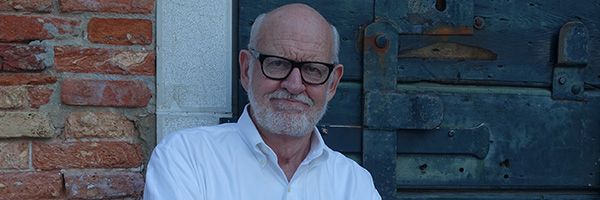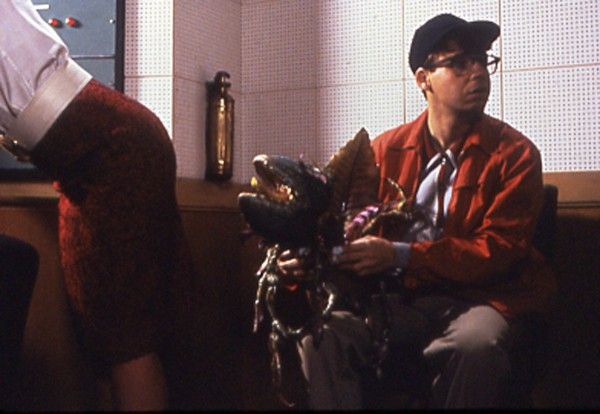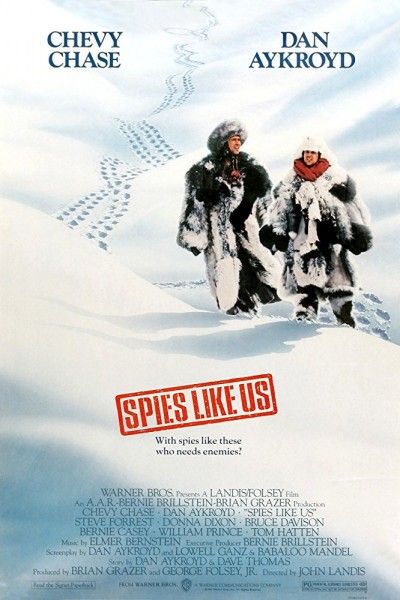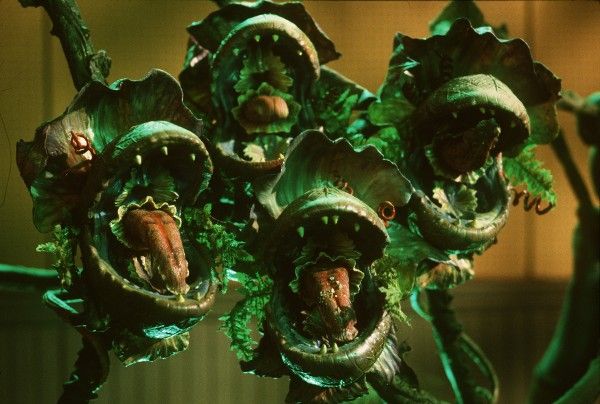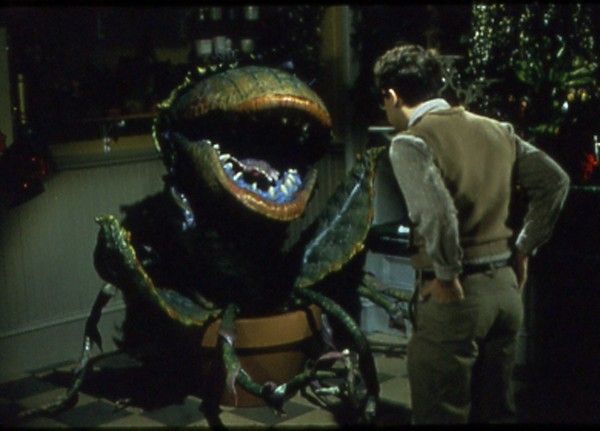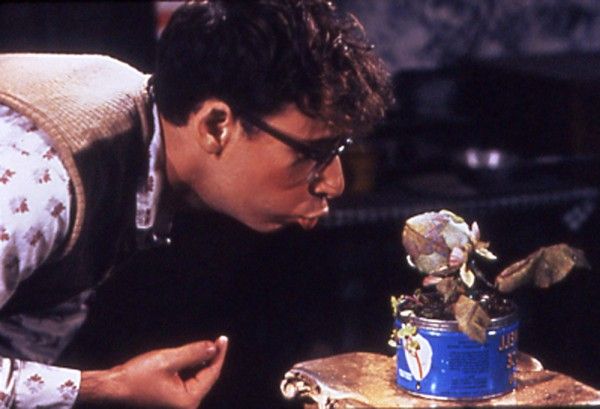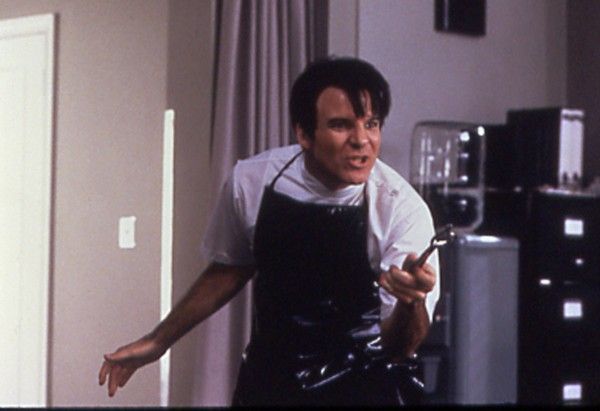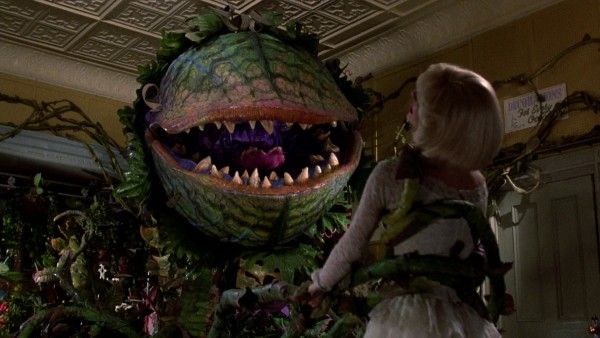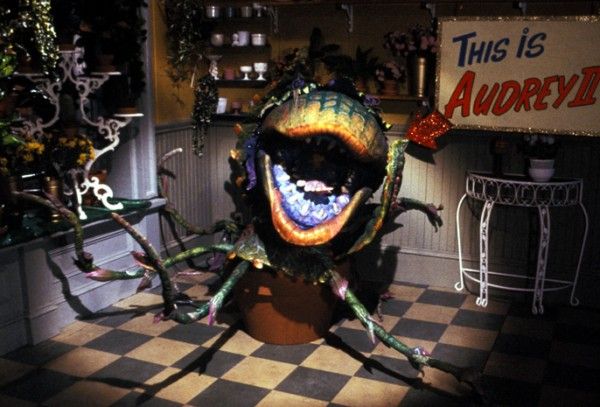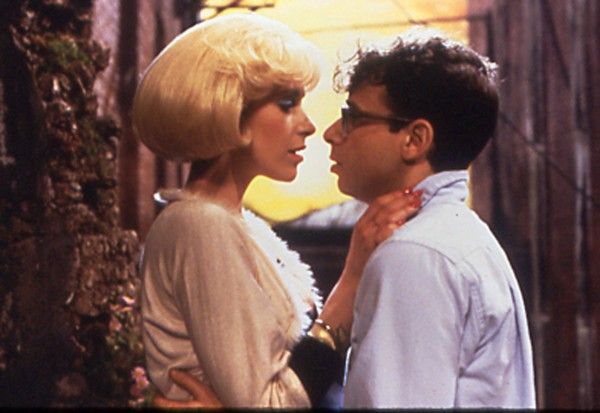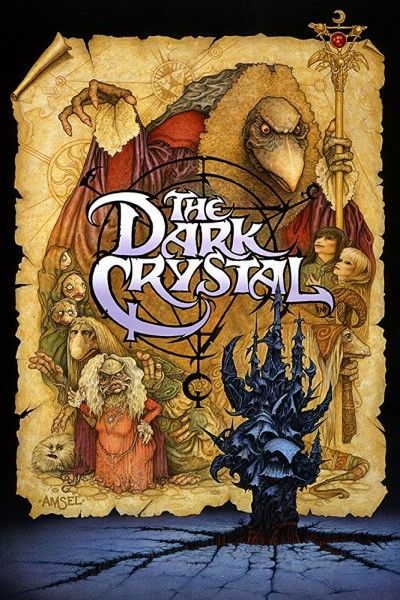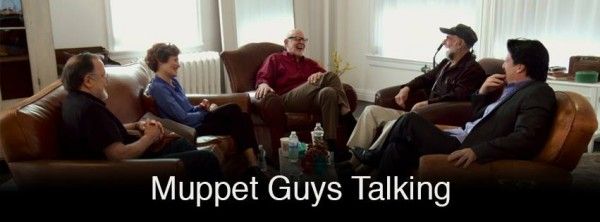It’s not too often you get to talk with someone who truly changed your life, but it happened to me a few days ago when I got to have an extended conversation with director Frank Oz. If you're not familiar with Frank Oz's incredible resume, he's the voice of Yoda in Star Wars, Fozzie Bear, Miss Piggy and Animal in The Muppets, and other unforgettable characters.
The reason he got on the phone with me was to talk about the an awesome event happening in the next few days: Fathom Events is showing Little Shop of Horrors with the original, deleted ending and it’ll be the very first time you can see it in a movie theater! You can buy tickets here.
For those unaware, when Frank Oz made Little Shop of Horrors back in 1986, it originally had a much darker ending where all of the key people were eaten and the film ended with Audrey II taking over the world. While you might be able to pull that off nowadays, in the mid-80s, it was unheard of.
So when the studio went to do some test screenings (which happens before every movie gets released so the filmmaker and studio can see how it plays and if anything needs a tweak), they quickly discovered the dark ending wasn’t going to fly. Preview audiences hated the ending but loved everything that came before it. To try and salvage the film, Frank and screenwriter Howard Ashman sat down and rewrote the ending to have Audrey (Ellen Greene) and Seymour (Rick Moranis) survive. After filming the new ending they tested the film again and the audience embraced the change.
Over the years people talked about that original ending and for a brief moment when the Little Shop of Horrors DVD was first released in 1998, it included a black and white unfinished version of the dark ending, but was quickly pulled from store shelves. Then, in 2012, the completed dark ending was released on Blu-ray and DVD. But except for one screening at the New York Film Festival in 2012, being able to see the original version of Little Shop in a movie theater has been impossible. That's why Fathom Events doing special screenings on October 29th and 31st is so cool.
During my wide-ranging conversation with Frank Oz we talked about the making of Little Shop of Horrors, when he first heard about the re-release, what it was like working with Howard Ashman, what those original test screenings were like, the major challenges of Audrey II's performance, and so much more. In addition, we also talked about working with Jim Henson on The Dark Crystal, his upcoming Muppet documentary Muppet Guys Talking, if he remembers any deleted scenes from the Star Wars movies that still haven’t been released, and more.
Collider: I like to start off interviews with some fun questions, and with you I'm very curious about your experience making the films Spies Like Us.
OZ: That was fun. John [Landis], essentially we're friends and so he just would ask me to come, and the reason I did is not funny, but the reason I did it -- and did any of his movies was as a director -- it's important I think for a director to get in front of camera and see and feel how frightened the actors are. That's the real reason I did it, to remind myself that actors are very vulnerable in that situation. I don't remember anything funny about that, but I think I did a lousy character and John came to me and said, "No, let's not do that, Frank. Let's do something else."
I really like that movie, and I always do the, "Doctor? Doctor. Doctor? Doctor," to people all the time and they have no idea what I'm talking about.
OZ: No, it was very funny. A very funny movie.
Jumping into why I actually get to talk to you today, what's amazing about Little Shop is it's finally going to be in theaters with the ending that you guys made all that time ago. When did you find out that they wanted to do a theatrical re-release and include the original cut that you had?
OZ: It was a surprise to me. Quite a wonderful surprise. Kurt Galvao is a wonderful guy who's the head of the Post area in Warner Brothers. He and his team looked through all the vaults for old pieces of film to put together for old Blade Runner and all the old, great stuff. All of a sudden I got a call from somebody when I'm next in LA to take a look at what he did. And I came and I was just amazed. I really had absolutely nothing to do with this. It was like a Christmas present for me; this probably was a few years ago.
I know this is the first time it's on screens across the country, but it was on the screen on one screen and that was after Kurt put it together some time after the New York Film Festival for some sort of "iconic films" thing, so that was very nice, but that's the only time it's even been on the screen.
The other thing is, and you know, with a film festival there's like 300 or 400 people that get to see it and that's it.
OZ: That's it, exactly right. It's wonderful now that people can see it. Again, wonderful for Richard Conway who did the effects and the terrible thing is his effect we cut out in the beginning because it was not a happy ending and so now even though it's not a happy ending I think people ... Some people will not like the ending because it's not happy, but it stays truer to the Faustian bargain that Howard [Ashman] wrote it for. Now the first time we see it on the big screen, I'm looking forward to it.
I was going to say that obviously I loved Howard Ashman's work. It's just so sad he died so young. But I have to ask you about working with him because he made this movie with you before he went on to do Little Mermaid and Beauty and the Beast and Aladdin. This was the beginning of his just unbelievable run. Can you share what it was like working with him and did you have any idea that he was as talented as he was?
OZ: Oh yeah. Oh no, he was a genius. He was brilliant. You knew it right away because he had a lucidity about him. He knew precisely what he was doing. When he was writing this he knew precisely that it was a combination of science fiction but real caring about two people, but at the same time it had to be tongue in cheek. It was a very interesting and difficult line to tread for him, but he knew exactly what he was doing, and he was one of those amazing people who could actually do it.
When you guys were putting it all together and in the pre-production stage, did a lot change along the way? I'm always curious about the development process.
OZ: Things changed. It came about because David Geffen asked me to do a rewrite of this. He had seen Muppets Take Manhattan and he asked me to do a rewrite because they had tried it with a couple other directors and it didn't work. I rewrote it, I was in London for about a month and rewrote it. I felt good about it and I knew that it was going to go ahead because I felt good about it. David and Howard both liked it and said, "Let's go."
Yet at the same time, after we started going it was still in the process of discovery, to the extent that "Mean, Green Mother From Outer Space" was not planned to be shot. I think there was another song that's possibly from the play? I'm not quite sure, but I asked Howard to give me a couple of songs for the ending. The ending wasn't climactic enough in what we had. He was wonderful and he was extraordinary. He sent me two new songs and "Mean Green Mother" was the one I chose. That's kind of the process of that ending now.
It's also crazy because I've done a little research into the making of the film and what went on, and that basically you did two test screenings with that original ending and both of them apparently did not do well.
OZ: Correct. They didn't. The first one in San Jose ... Actually it's not true. They did amazing. They were clapping after every single number. It was amazing. What didn't go well was the very last part of the ending where Ellen and Rick were both killed by the plant and the plant won. It was 30 years ago. I think we had a bit more of a period that was not as cynical as we have today, so today it might work, but then the ending was not satisfying which I understand and Howard did too. We had no choice but to do ... Not because David or Warners pushed us, but it was self-evident because the cards were saying, "We hate the fact that you killed Ellen and Rick," because they loved Ellen and Rick.
Of course, I think I've said this many times before is that my lesson learned was two-fold. One was when one is having a character on-stage killed, that character comes back for a bow. In a movie, the character does not come back for a bow. That character is dead, and because they loved Ellen and Rick so much they were very upset at the end. It's not that they didn't like the movie, it's the end they didn't like. They hated the fact that we killed our stars.
The other thing I learned was the power of the close-up, because the close-up in a screen as big as the one that showed Little Shop, the close-up shows the absolute nuance of the feeling behind the face, and that I didn't realize when I did that. That was only my third film. First, Dark Crystal helping Jim. Then my own film Muppets Take Manhattan. I was still learning along the way. So those are the reasons why we had to have a new ending, because Howard and I both realized it without even Warners telling us or David telling us, and we knew what we had to do, and we did this satisfying, happy ending.
Now today's world, I'd be very curious because I think there'd be many people that still love the happy ending, I understand that, but I'm curious with today's world if there would be a depth to the ending that was not recognized before because the manner in which the world is right now. It'd be very interesting.
Also there are so many more television shows and so many more movies that have shown dark stuff, but I see both sides of it as a fan. But I'm curious, when you did the test screenings, how complete were the visual effects of the ending? Was it done-done or was it ...
OZ: No. No, this is what happened. During that time, I don't know if you know film or not, but most people don't now. During that time we previewed with the ending. We previewed the entire movie with something called a work print, which means it wasn't finished. You had the scenes and you eventually, essentially with a guillotine slice and you just tape them, like Scotch tape almost; we had all these pieces of film, it was taped together.
We showed the work print, which meant that when we realized that everything worked except the ending, we took apart the ending because it was in bits and pieces, taped together. We took that ending out and undid those tapes and there were just pieces of film left and then we scavenged from those pieces of film things we wanted to use still in the movie. What Kurt did was he went to the vaults and he found my notes and with those notes he found all those pieces of film from the work print.
Which, to answer your question, they were not full optical, they were called slashes at that time. They weren't complete and he put that all together for this thing here. The long answer was, no they were not completely finished.
Your DVD of Little Shop of Horrors, when it first came out they released that black and white version of the original ending, and I remember at the time everyone was clamoring for it because it was pulled after about two seconds.
OZ: Right.
Did they tell you that they were going to do that with the DVD, or how did you find out about it?
OZ: Well, I’m innocent. I was in my home and somebody from Warners Post-Production called me and said they'd like to add the ending to the DVD special so I said, "Okay. It's not the real ending but I have a black and white version of the work print." The work print that we took apart, but I had an old duplicate, so I thought ... I should've asked questions, but I thought that it was okay to do that and I sent the black and white version. Then it came out and I got a call from David and David said, "What the hell are you doing, Frank?"
I said, "What? What?" He said, "I have the color version. I don't want that black and white version out." I assumed that David and Warner Brothers had okayed it, so I said, "Fine, David. No problem. Just take it out." That's what happened. It was just an innocent mistake on my part, and David wanted it to be better for the fans, which I understand.
Do you remember how long it was on the store shelves before it was pulled? I thought it was almost instantly that it was pulled.
OZ: It was pretty fast. They're collector's items now. They were pretty fast.
I have a friend who had it at the time and it was something that everyone was like, "Oh my god, we all got to go watch this."
OZ: I don't remember but it was ... Remember, that was 30 years ago, but I remember it was fast.
Can you talk a little bit about the major challenges of Audrey II's performance, say, compared to dealing with Muppets?
OZ: There's no comparison. The only comparison would be when we dealt with the small Audrey II when it was cabled and it was hand ... Those were similar but when you got down to the 9 foot puppet and then eventually got down to the 12 foot puppet that weighed a ton, there's no comparison to anything that's ever been done before. I can only tell you that the larger puppet was the biggest challenge.
As a matter of fact I describe it in my introduction that was filmed to the film, to the showing, which was that there was a person in the head and there is a steel beam coming from the back, which we hid, you couldn't see. There are people in the back moving that girder which then moved the head very slowly, and then I sped it up and so therefore the slow became fast along with about 30 puppeteers underneath the floor cabling all the vines. It was a massive job.
I can't even imagine.
OZ: Nobody had ever done anything like that before so there's no comparison to anything.
Do you remember, besides the ending being changed, do you remember if had any other deleted scenes or was it pretty much pretty close to what you shot?
OZ: It's pretty close to what I shot. I don't overshoot. This was ... Even though I rewrote it, I didn't touch the dialogue. I just had to restructure things and I had to make it into a movie sensibility instead of a theater sensibility but other than that, the show ... As a matter of fact I took some things out of the show, like “Mushnik & Son” was a number. I took things out and I put "Angry Mother" in, things like that. But I don't recall overshooting. I'm pretty good that way. I don't recall shooting more scenes. I certainly recall shooting more footage in a scene but I don't recall shooting other scenes.
There are so many stories about getting Bill Murray to be in your movie, how he doesn't have a phone number, that you're not sure he's going to show up till he's actually there. Getting Bill Murray to be in Little Shop, was it a challenge back then or was it a little bit easier than it is now?
OZ: It's much easier now. I hadn't seen Billy for years. I did a whole movie really with What About Bob?
Totally.
OZ: He's brilliant. At that time, I knew him before. I met him a little bit here and there, and so it was David's idea to have Billy, and having known him before a little bit, we talked about it and he came in and we rehearsed the night before and then we shot it the next day. It was more of a deal-making situation between him, his people, and David Geffen, which I was not a part of, so I don't know how easy that was, but as far as getting him as a performer creatively it was easy, because we both agreed to what to do.
If you don't mind I want to switch actually and ask you a few questions about Dark Crystal.
OZ: Sure.
I'm very curious, with that movie, if I'm not mistaken, when they did the test screening on that, Jim [Henson] ended up removing 10, 20 minutes of the movie or something like that. Do you remember what it was like in the editing? How involved were you in the editing room and those test screenings?
OZ: I was every day there.
Can I ask you, did a lot change after test screenings? Has any of that footage still never been seen?
OZ: I think that some footage hasn't been seen. Again, that's what test screenings are for. That's why people shoot a half an hour over, which I don't necessarily do, but people do that, in order to test and see what works and what doesn't work. And then usually in films, they have scenes that are deleted, which now are used in the DVD because the scenes that are deleted were too invasive or the structure didn't work properly.
With Dark Crystal, there was a scene. What was it? I think it was a funeral scene. I think it was a scene when the Emperor died, there's a funeral scene, rather a funereal walking scene of the Skeksis in line. I think that wasn't used as I recall, but again, this is 33 years ago now so it's hard to remember.
I know, this is forever ago. I like putting people on the spot.
OZ: I think that's the one scene that I recall and there may be others but I don't know.
What do you remember most about making Dark Crystal and collaborating with Jim, is there a day or two that sticks out for you or is it pretty much the entire shoot was just one of those special things?
OZ: When you say special what you really mean is hard.
Exactly.
OZ: It was so ... It's because Jim, and it was his movie. I helped him direct the movie, but he had the vision. It was because of Jim not accepting the impossible and as a result he would work harder than anybody I've ever known because he was the one who led the way by working harder. None of us could say no because he always worked harder than us. When you say special, I think that really is the memory that I have, the incredible upward hill journey that we had to do every single day. It was very tough.
There were certain days that I think ... Do I remember certain days? I don't really. I remember the entire sequence that was a challenge every single day.
It's crazy because at the time, this is early '80s, I think it's the first live-action film that didn't have any humans in it. I could be wrong but I think it is.
OZ: I don't know. I don't know the answer. I wouldn't bet on that because I haven't done any research, I don't know.
There's been talk that they're going to be doing more Dark Crystal stuff on Netflix. I believe it actually might even be going into production soon. Are you involved in that at all? Is it something that you're just curious to see as a fan?
OZ: I'm not involved in the slightest. I say “godspeed.” [Laughs] I am not involved. Nobody's mentioned it in any way to me whatsoever. I'll be very curious to see it.
I'm very curious what can possibly happen but I want to ask you, I believe you did a Muppet documentary?
OZ: Yes. We shot a Muppet documentary years ago and we took it to the South By Southwest.
That's what it is, yes.
OZ: It's really quite extraordinary, the reaction. It's really quite amazing. What we are doing with it, we didn't go to any of the festivals. We're not selling to Netflix or anybody else. We are selling it online on our own website on March 16th, and we're preparing it so I'll just use a plug here. If anybody would like to know when it's available, it will be ... The best thing to do is go right into MuppetGuysTalking.com.
MuppetGuysTalking.com is where we'll know who wants it. We'll be doing a lot on that situation where we'll be giving information about Muppets. We'll also have all of us guys in the Muppet documentary online talking to them, answering questions. We'll be doing a lot of cool stuff but yes, that documentary is really about how it was to work in the culture that Jim created. The working culture, and it's with five of the original Muppet performers who worked with Jim for 30, 40 years.
Did people come to you ask you to buy the film? Netflix or Amazon or any of these platforms?
OZ: Yeah, they did, but we don't think they realized ... and it was at a low cost. We know that they don't understand the value of it around the world. This is not just a domestic release. We have a wonderful, wonderful fan base around the world who we want to give this to as a low-cost gift so they understand how it was to work with Muppets. We're not trying to make tons of money out of it, we just want to make sure that everybody sees it.
I think they just saw it as just another acquisition and it's much more to us than that. It's to show people around the world how one can work together with a lot of fun, with a lot of loyalty, and work like hell and do good work.
When do you think you're going to release a trailer for it?
OZ: I'm not sure we're going to release a trailer or not. We're going to be releasing sections of it as time goes on, but we don't want to show too much of it. We are going to instead offer things for free. Just offer a question/answer time with me and the guys, and we're going to have some other things going on which we're thinking about right now which is cool, but we're not treating it like a movie and a film trailer. We're treating it like it's a special event that we want to give to people to ... I'd give it away, but I don't believe people will value it. It's like, you have two T-shirts there. One costs $5, one costs $100 and they're the same T-shirts, you know?
Sure.
OZ: If you didn’t buy the $100 one all of a sudden you think you didn’t get the good one. Ours is going to be very cheap, but we are going to charge for it, just so people don't just put it on the side. They'll see the value. We're not treating this like a movie, we're really treating it like a piece of education, a piece of social commentary, it's a piece of cultural commentary. It's more that, yet it's very, very funny too. We have a lot of film quotes in there.
So, I'm a huge fan of everything you did with Star Wars, and my big question is, because I don't want to pepper you with Star Wars questions, but are there deleted scenes that you remember doing, or scenes that you remember filming that have still never seen the light of day? Or do you think that stuff's all out there?
OZ: You know, I've done five of them now so it's difficult for me to remember, over a period of 25, 30 years. If I recall … George [Lucas] as a producer and as a director shot and supported the director economically. I don't recall any scenes that were cut. That may just be bad memory, wishful thinking, I don't know but I don't recall anything that we shot that wasn't used, in part because the scripts are pretty well vetted by George and everything, and he's very good at story, and so when you get to shooting it, what you're shooting is so expensive … When I did Yoda, these are tough days and expensive days, you want to make sure that what you shoot, you keep. My feeling is that I don't believe there's footage ... not footage, but rather scenes that have not been used.
I've always wondered, because I'm always curious about deleted scenes and stuff like that, the fans love it, myself included.
...Seeing the cutting room bits. Listen, I could ask you a million questions about Star Wars stuff but I will not, because that's a whole separate chapter.
OZ: You're allowed one more question about Star Wars.
Well, hypothetically, did you borrow anything from set? You know what I mean? When you were making these movies back then or … When you're there and you're working on it all day at the time, you're like, "Forget it, I don't want to take any of this home."
OZ: Steve, you suggested I stole? [Laughs]
I said did you hypothetically borrow anything from set! You always planned on bringing it back!
OZ: Are you a cop? The answer is no, I would never take anything from the set. Honestly my mind is only on one thing and I prep and I prep and I prep and my mind is full the morning of shooting so I can get the job done in an economic manner and the manner at which we can do best for the director. I think of nothing else but that.
I guess one of my last things, which has nothing to do with Star Wars, how many answering machine messages have you left since 1980 as different characters, or is it something you just don't do?
OZ: Zero. None.
Really?
OZ: I won't.
Not even a family member got you to do it?
OZ: None. None. People do that and I don't do that. I think it's a cheap use of character that I care about. I can always do any of my ... I don't know how many characters I do. Any of my characters. But they're not a party trick just to get attention. I have no interest in getting attention, I just want to do good work, and in order to do good work one has to keep the characters pure. And if the characters are going to go do some shtick on a phone, that's not them anymore. That's just a bastardization of them. My job is to keep those characters pure.

